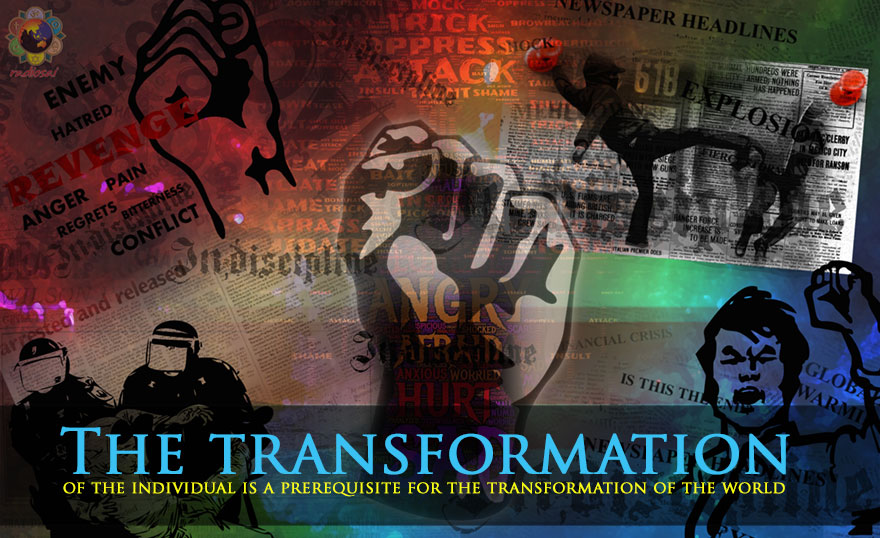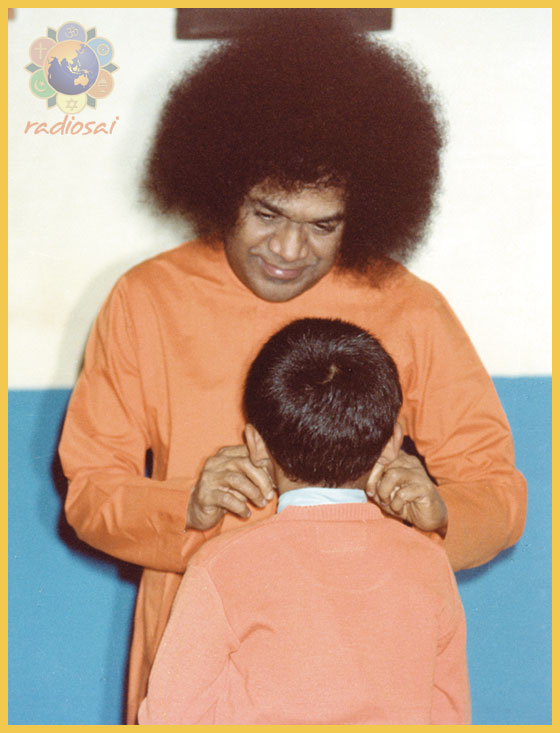|
|
| 'Like' us on Facebook | Follow us: |
Posted on: June 14, 2016
 |
Guru Poornima Special Offering
(Daily Episode)
Part - 6
In 2006, eager to start a service which will help everyone to connect with Bhagawan's teachings on a daily basis, Radio Sai began 'Sai Inspires'. All who subscribed to this service, received an email from us which had a concise message of Baba accompanied with His image. This daily offering was received well, and soon the subscriptions grew. Today nearly 100,000 people from all corners of the world wait for this message to help them tide over their day with peace and ease. The power inherent in these discourse capsules is indeed tremendous. How much we benefit from it and how best we harness this energy depends purely on how seriously we ruminate over these words and how sincerely we put our learning into action. To help us in this noble and elevating exercise, Prof. G. Venkataraman has taken time out to elaborate on these messages. His reflections will not only give us a deeper understanding into what the Lord is communicating to us but also give us tips to translate them into our daily practical life with more ease.
The best way to value the Master is to master His values. As we prepare to celebrate Guru Poornima (July 19), when we pay our respects and obeisance to the Divine Master, let us work to offer Him the tribute that the Lord loves the most from us - to make our lives His message, to make His love and wisdom shine in us. To aid us in this endeavour we have this series where Prof. Venkataraman for the next 26 days from June 9, 2016 shares his insights on select Sai Inspires messages. We hope this will help us to understand His teachings better and bolster our determination to walk on the sacred path.
Sai Inspires Message
NO ONE IS EXEMPT FROM SATHYA AND DHARMA
The Truths proclaimed in the Upanishads - Sathya and Dharma (Truth and Righteousness) - have to be practiced by everyone irrespective of caste or community. The practice of good conduct is the natural duty of man. You should realize that the happiness of individuals is dependent on the welfare of the society as a whole. The transformation of the individual is a prerequisite for the transformation of the world. Together with changes in the political, social and economic spheres, we need transformation in the mental and spiritual spheres. Without such transformation all other changes are of no use. Therefore, make your actions pure. Only then can the human rise to the level of the Divine.
• Divine Discourse, July 28, 1992.
REFLECTIONS
This is one of those quotes where Swami connects individual behaviour and society. I do not know how many of you have taken a stroll through the small garden in front of the college building in Brindavan. If you have, you might have noticed many stone slabs with Swami’s sayings painted on them. One of them says, as best as I can remember, without individual character, there is no national character. The above quote, basically underscores that one important and most crucial point.
 |
You may not believe it but sixty odd years ago, corruption was not all that common. These days it has not only become common and global but what is worse, people seem to accept it as a part of life. This is not only wrong but utterly dangerous. It is because corruption has become global that we have organisations like Transparency International that give rankings to countries on the basis of how corrupt the country is.
Now corruption is a very serious matter, far more serious than people realize. It is not something to read about in newspapers and then ignore. To do so would be as stupid as a patient ignoring the warning given by his doctor that he has cancer and that he had better rush to get it treated.
These days, corruption is so widespread that many people shake their head and mutter, “Listen, this evil is too far gone; nobody can stop it.” Strangely, that statement is both true and false. You might wonder what kind of nonsense is that. Well, let me tell you it is NOT nonsense, and here is my point.
I do not know how many of you are aware of the history of World War II. One important event in that was the Battle of Stalingrad that took place between August 1942 to February 1943, between Hitler’s army and the Soviet troops. Hitler had superior arms, lots of tanks and that kind of stuff. But his troops found the Russian winter too severe and could not fight at their best. The Soviets had inferior arms but what happened was that almost all the people of Stalingrad rose to join the Soviet troops and give a fight to the Germans. So it came to a fight between a very large number of people who were ill-equipped but determined to keep the enemy out of their country by fighting to the bitter end, and a small, well-equipped army but with rather demoralized troops. In the end, the Germans army was stopped and forced to retreat, rather like what Napoleon was forced to do about a century or so earlier. In fact, this was a major turning point in the war.
OK, that was a nice history lesson but what has it got to do with corruption, and the Swami quote in the beginning? Simply this:
• When the enemy is strong, people must join together to fight the enemy.
• They must be solidly determined to push the enemy back, come what may, and that is what the Russians did.
• It was not merely the Russian army but the people of Stalingrad who together threw the Germans out.
• In all such cases, a heavy price may have to be paid. Where the battle of Stalingrad is concerned, about 2 million people perished.
 |
If I were to paraphrase all of the above, it would simply translate as below:
If the objective to be attained is very precious, then one must be ready to pay any price to achieve it. In particular, one must be ready to sacrifice any amount. Above all, the enemy being powerful, can be defeated only if all people decide to come together.
Now curiously, whenever there is an external enemy as always happens in war, people unite easily; it has always happened in history. But when the enemy is internal, such unity is rare. That really is the problem. Let us keep this in mind and examine why people merely complain about corruption and hardly do anything about it.
If you think about the problem of corruption, the enemy is greed, individual greed. Individual greed can and often does disrupt social systems and when such disruption becomes widespread, there is a national problem. Here is a simple example. It is not uncommon for people who want to become truck drivers to get a driving license, even if they are bad drivers and are totally ignorant about road rules. How do they get the license? By giving a bribe of course. When you have tens of thousands of such unqualified drivers, driving badly maintained vehicles, on bad roads at night, it is no great surprise there are any number of roadside accidents, many of which lead to death. I believe that currently, with over 130,000 deaths per year, India leads the world in traffic deaths, overtaking even China. America has lots more vehicles on the road and yet where traffic deaths are concerned, India leads; what a dubious distinction!
So you see, there is a loop here. Individual greed starts spreading and causes harm on a large scale. And that problem can flow back and impact individuals. Thus, when bad drivers are all over the place, innocent people can and do get killed, often for no fault of theirs. I think you can get the picture I am trying to present. Before I close, let me correct a major wrong impression that has been created that corruption is connected solely with passing money under the table to getting things done illegally. That might be the legal interpretation, but if one looks from a moral point of view, creating a wrong impression and tempting people to do things that are bad for them, all for the same of making a fast buck is equally deplorable. If you ask where is corruption here, I would say it is connected with the corruption of the mind.
The business world indulges in this all the time. Look at the ads for fast foods. These days, fast foods have become such an addiction that in some countries as much as 60% of the people are obese; this has serious national consequences, as everyone knows. Similarly, seductive ads that promote drinking and smoking are equally harmful to society as a whole. It might be legal according to laws written by man; but there is an over-riding law, the moral law that is transcendental. It is not the law written by man but the moral law dictated by Conscience that decides what is Sathya and what is asathya, what is Dharma and what is adharma. No one from king to pauper is exempt from Sathya and Dharma. It is when a majority start taking Sathya and Dharma seriously that we shall truly see a transformation of society, an outcome all of us dearly want but hardly bother to support via our commitment to moral imperatives.
Radio Sai Team
| comments powered by Disqus |






